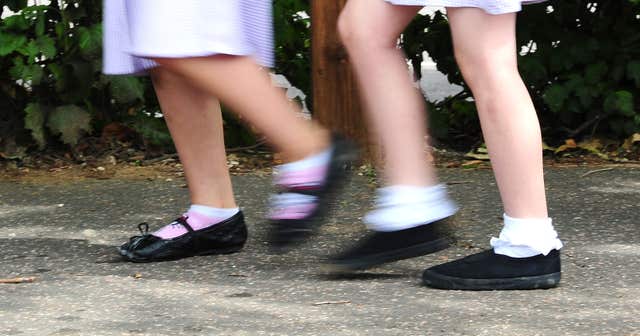A minister has insisted it is for parents to discipline their children after paediatricians called for a UK-wide ban on smacking.
The current law in England and Northern Ireland has created “grey areas” which mean there is sometimes a defence to physical punishment, the Royal College of Paediatrics and Child Health (RCPCH) said.
Wales made any type of corporal punishment, including smacking, hitting, slapping and shaking, illegal in March 2022, while Scotland introduced a similar ban in November 2020.
Treasury minister Laura Trott said the law in England is clear that any abuse of children is “completely unacceptable”.
Asked by Sky News if she would support plans to make smacking illegal in England and Northern Ireland, Ms Trott said: “We obviously have very clear laws in this country about abuse of children.
“They are very clearly set out in the Children Act, but it is for parents to discipline their children.”
Asked if she agrees with paediatricians the current law is vague, she added: “It is very clear that any abuse of children is completely unacceptable.
“We have been working very hard to make sure all the agencies involved with children are really cracking down on abuse, that there are clear guidelines involved.”
The RCPCH said amendments to the Children Act 2004 for England and the Law Reform Order 2006 for Northern Ireland “to remove the ‘reasonable punishment’ defence from all UK law are long overdue”.
Its report on the issue argued that ahead of a general election, this is a time for all political parties to “make meaningful commitments on this important children’s rights issue”.
Professor Andrew Rowland, a consultant paediatrician and RCPCH officer for child protection, said: “The laws around physical punishment as they stand are unjust and dangerously vague.
“They create a grey area in which some forms of physical punishment may be lawful, and some are not.”
He said he is “regularly faced with situations where it is alleged that physical punishment has been used against a child” but the “vague nature of the laws make it extremely challenging” to talk to families about what the rules are and therefore more difficult to talk about the best interests of their children.
He added: “This lack of legislative clarity can even add an extra layer of complexity when trying to identify cases of child abuse.”

He said society’s views on punishment have changed over time, with a majority of adults agreeing the physical punishment of children is unacceptable.
Physical punishment could also result in a child having the learned belief that violence is accepted and this could “lead to further instances of violence and harm later in life”, he added.
Prof Rowland said: “There must be no grey areas when it comes to safeguarding children. Changing the laws in England and Northern Ireland will give us absolute clarity and ensure there are no instances where it is acceptable or lawful to smack a child.”
Simon Calvert, from the Be Reasonable Campaign, claimed calls for a law change “are motivated by ideology, not by clinical evidence, and elected representatives must reject them”.
He added: “The current law strongly prohibits all violence against children, while protecting parents from prosecution for innocent and harmless parenting decisions.
“The reasonable chastisement defence is, by definition, limited to actions the court deems reasonable.”
A spokesperson for the Northern Ireland department of health said any decision to amend the legal position there “will require the agreement of the Northern Ireland Executive”.
A spokesperson for the Department for Education in England said: “Any form of violence towards a child is completely unacceptable and we have clear laws in place to prevent it. It is the responsibility of the parent to discipline their children, appropriately and within the boundaries of the law.
“We are supporting teachers, social workers and all safeguarding professionals to spot the signs of abuse or neglect more quickly, and our statutory framework for safeguarding children in England makes clear what organisations should do to keep children safe.”
You may also like: Paedophiles to lose parental rights under new law

